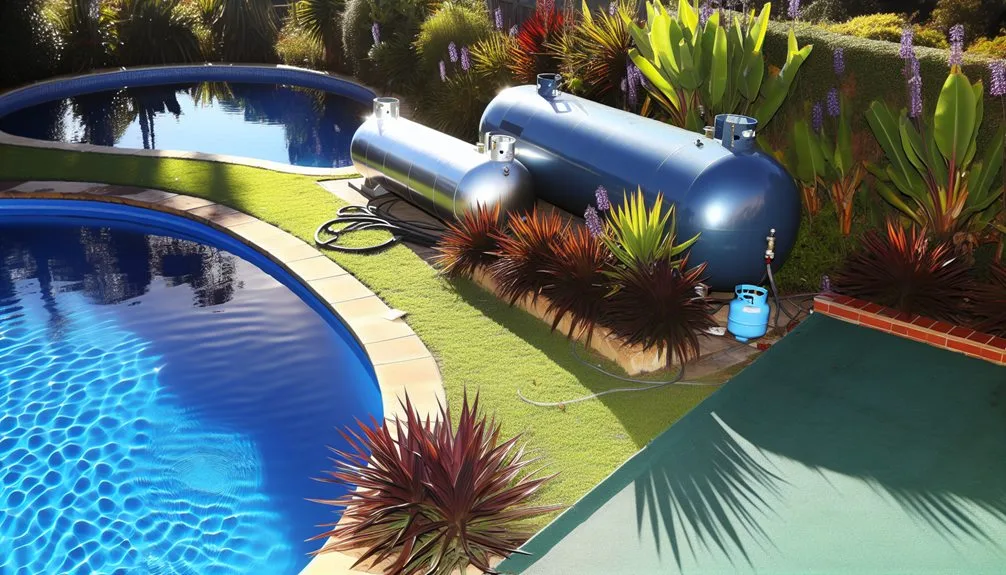When choosing a propane tank for your pool heater, consider a 100-pound tank. It holds about 23.6 gallons of propane, ensuring better efficiency and longer heating cycles. Smaller tanks, like 20 pounds, can lead to frequent refills and inconvenient downtime, especially during peak usage. Your propane needs depend on the desired pool temperature and how often you use the heater. A larger tank supports daily operation and enhances heating consistency. Assess your usage patterns to determine the best fit for your situation. There are key details and benefits that may further inform your decision.
Key Takeaways
- Determine your heating requirements based on desired pool temperature and heater efficiency to gauge propane consumption needs.
- Consider usage frequency; larger tanks are ideal for daily or frequent pool use to minimize refueling interruptions.
- Evaluate seasonal patterns; increased usage in warmer months may necessitate a larger tank for consistent heating.
- Choose a tank size that aligns with your pool's water volume and heating demands for optimal efficiency.
- Ensure proper installation and maintenance to comply with safety regulations and enhance the performance of your propane tank.
Understanding Propane Tank Sizes
When choosing a propane tank for your pool heater, understanding the different sizes available is vital. Propane tanks typically come in various sizes, ranging from smaller 20-pound tanks to larger 500-gallon options. The size you select directly affects the heating efficiency and duration of your propane supply.
Tank materials play a critical role in the durability and safety of your propane storage. Most tanks are made from steel or aluminum, with steel being more robust but heavier. If portability options matter to you, consider lightweight aluminum tanks, which offer easier transportation without sacrificing safety.
When evaluating tank sizes, think about how often you'll be using your pool heater and the average heating duration required. Smaller tanks may require frequent refills, while larger tanks provide extended use without the hassle of regular maintenance.
Ultimately, your choice should align with your heating needs, available space, and the frequency of use. Understanding these factors will help you make an informed decision that guarantees your pool heater operates efficiently and effectively.
Factors Influencing Tank Size
When selecting a propane tank for your pool heater, two critical factors are heating requirements and usage frequency.
Your pool's size and desired temperature will dictate how much propane you need to maintain comfortable heating.
Additionally, if you use your pool often, a larger tank will guarantee you have enough fuel readily available.
Heating Requirements
Choosing the right size propane tank for your pool heater depends on several heating requirements that directly influence your energy needs. The primary factor is the desired pool temperature. The higher the temperature you want to maintain, the more energy you'll require.
Consider the volume of water in your pool; larger pools need more heat, which translates to greater propane consumption.
Another vital element is heater efficiency. Different models have varying efficiencies, often expressed in BTUs (British Thermal Units) per hour. A more efficient heater will use less propane to achieve the same temperature.
For instance, if you have a high-efficiency heater, you might be able to use a smaller tank compared to a less efficient model, even if you want to reach the same pool temperature.
Additionally, the heating time plays a role. If you plan to heat your pool quickly, you may require a larger tank to support the rapid demand for propane.
Understanding these heating requirements will help you select a propane tank that meets your pool heating needs without running out of fuel during the swimming season.
Usage Frequency
Usage frequency plays an important role in determining the appropriate size of your propane tank for a pool heater. Evaluating your usage patterns will help you identify how often you plan to heat your pool, which directly impacts your propane needs.
Consider these factors:
-
Daily Usage: If you heat your pool daily, you'll require a larger tank to accommodate the propane consumption.
-
Seasonal Variations: During warmer months, you might use your pool more frequently, increasing your propane demands. Conversely, your usage may drop considerably in cooler seasons.
-
Event Scheduling: If you host gatherings or events, you may need to heat your pool more often, necessitating a larger tank for those occasional spikes in usage.
Standard Propane Tank Capacities
Standard propane tank capacities vary considerably, influencing your choice for a pool heater. Typically, propane tanks come in several types: 20-pound, 30-pound, 40-pound, and 100-pound tanks. Each type has its specific capacity and intended usage. For instance, a 20-pound tank holds about 4.7 gallons of propane, while a 100-pound tank can hold approximately 23.6 gallons.
When selecting a tank, consider not only the capacity but also tank portability. Smaller tanks, like the 20-pound and 30-pound types, are easier to transport, making them ideal for those who may need to refill or relocate their tanks frequently.
Larger tanks, while offering more fuel, can be cumbersome and may require specialized equipment for handling.
Choosing the right propane tank size is vital for efficiency and convenience. A tank that's too small may require frequent replacements, while one that's too large could lead to unnecessary expenditure and space consumption.
Assess your specific heating needs and the tank types available to determine which capacity best suits your pool heater setup. Being informed about these options guarantees you'll make a more effective choice for your heating system.
Calculating Heating Needs
Understanding your pool's heating needs is key to selecting the right propane tank size. To calculate these needs, consider several factors that influence energy efficiency and heater compatibility. Knowing the specifics will help you make an informed decision.
-
Pool Size: Larger pools require more energy to heat, affecting the amount of propane you'll need.
-
Desired Temperature: The higher you want to heat the water, the more energy will be consumed.
-
Heating Time: If you want to heat your pool quickly, factor in the energy demands of quicker heating methods.
Begin by determining your pool's surface area and the temperature you want. Use the formula to find out how many BTUs (British Thermal Units) your heater needs to raise the temperature by a specific amount.
Then, check your heater's specifications for compatibility with propane.
Benefits of Larger Tanks
Choosing a larger propane tank offers several advantages that can enhance your pool heating experience. One of the primary benefits is improved tank efficiency. Larger tanks can store more propane, allowing for longer heating cycles without frequent refills. This means you can maintain a comfortably warm pool with less interruption.
Additionally, larger tanks contribute to energy savings. With more propane available, your heater runs less frequently, which can reduce overall energy consumption. Here's a quick comparison of the benefits based on tank size:
| Tank Size (Gallons) | Heating Duration (Hours) | Estimated Energy Savings (%) |
|---|---|---|
| 120 | 20 | 10 |
| 250 | 40 | 15 |
| 500 | 80 | 20 |
| 1000 | 160 | 25 |
| 2000 | 320 | 30 |
Downsides of Smaller Tanks
Using a smaller propane tank for your pool heater means you'll face limited heating duration, which can interrupt your enjoyment.
You'll find yourself refueling more often, leading to increased downtime and inconvenience.
Ultimately, these factors can contribute to higher overall costs, negating any initial savings from choosing a smaller tank.
Limited Heating Duration
Smaller propane tanks can greatly limit the duration of heating your pool, leading to frustrating interruptions during your swimming sessions.
When you opt for a smaller tank, you might find that your pool heater runs out of fuel before you achieve your desired temperature. This can considerably impact your heating efficiency and overall enjoyment.
Consider the following downsides of limited tank size:
-
Frequent Heating Interruptions: You may need to pause your swimming until the tank is refueled, disrupting your relaxation and enjoyment.
-
Inconsistent Water Temperature: Smaller tanks mightn't provide enough fuel for consistent heating, leading to fluctuating temperatures that can be uncomfortable.
-
Seasonal Usage Limitations: If you plan to use your pool frequently during warmer months, a smaller tank mightn't support extended heating needs.
Increased Refueling Frequency
With a smaller propane tank, you'll likely face increased refueling frequency, which can become a significant inconvenience. This is particularly true if you're using your pool heater seasonally. A smaller tank simply can't hold enough propane to support extended heating sessions, leading to more frequent trips to the refueling station.
Managing refueling logistics becomes paramount when dealing with smaller tanks. You'll need to plan your fuel runs carefully, ensuring you have enough propane to meet your heating needs, especially during peak swimming months. This can disrupt your schedule and lead to unexpected downtime if you run out of fuel unexpectedly.
Additionally, if you're hosting pool parties or using your pool frequently, the need for quick refueling can be a hassle. You may find yourself juggling multiple refueling trips, which can be time-consuming and frustrating.
In contrast, larger tanks can provide a more consistent supply of propane, reducing the frequency of refueling and allowing for uninterrupted enjoyment of your pool.
Ultimately, choosing the right tank size is essential to minimize the inconvenience associated with increased refueling frequency.
Higher Overall Costs
Frequent refueling not only disrupts your schedule but also leads to higher overall costs associated with owning a smaller propane tank.
When you opt for a smaller tank, you may think you're saving money initially, but a thorough cost analysis reveals a different story. The frequent need for refueling can result in expenses that quickly add up.
Consider these financial implications:
-
Higher delivery charges: Smaller tanks often require more frequent refills, leading to increased delivery fees each time.
-
Increased fuel prices: Some suppliers may charge more per gallon for smaller deliveries, negating any initial savings.
-
Limited bulk purchasing options: Owning a larger tank allows you to buy propane in bulk, often at a lower price per gallon, contributing to long-term savings.
In the end, while a smaller propane tank may seem convenient, the higher overall costs can outweigh the benefits.
You'll need to factor in these hidden expenses when planning your pool heater setup.
Opting for a larger tank not only minimizes refueling interruptions but also offers a more economical approach in the long run.
Installation Considerations
When considering the installation of a propane tank for your pool heater, it's vital to evaluate the tank's location relative to both your heater and any local regulations. Proper tank placement is essential for efficient operation and safety.
You'll want to position the tank close enough to the heater to minimize gas line lengths, which can reduce pressure loss and improve performance. However, avoid placing the tank too close to any structures or flammable materials, as this could pose safety risks.
Before proceeding, check local regulations regarding propane tank installations. These rules often dictate minimum distances from buildings, property lines, and other installations. Compliance with these regulations guarantees not only safety but also avoids potential fines or complications during inspections.
Additionally, consider the accessibility of the tank for refills and maintenance. A well-placed tank can simplify these tasks, making it easier for propane service providers to reach your tank.
Maintenance and Safety Tips
Proper maintenance and safety practices are essential to guaranteeing the longevity and efficiency of your propane tank and pool heater system. Regular tank inspections and adherence to safety regulations can prevent accidents and optimize performance. Here are some key tips to keep in mind:
-
Conduct regular tank inspections: Check for leaks, corrosion, or damage. Use soapy water to test connections; bubbles indicate leaks.
-
Follow safety regulations: Familiarize yourself with local codes regarding propane storage and usage. Confirm that your tank is placed at a safe distance from your home and other structures.
-
Ensure proper ventilation: Make sure your propane tank and heater are in well-ventilated areas to prevent the buildup of harmful gases.
Additionally, consider scheduling professional maintenance at least once a year. This guarantees that your equipment operates efficiently and safely.
Always keep a fire extinguisher nearby and know how to shut off the propane supply in case of an emergency.
Frequently Asked Questions
How Often Do I Need to Refill My Propane Tank?
The refill frequency of your propane tank depends on its capacity and how much you use it.
Generally, a larger tank holds more propane, reducing the need for frequent refills.
If you're using your propane for heating or cooking, you might find yourself refilling every few weeks.
To maximize efficiency, monitor your usage and check your tank's gauge regularly, ensuring you always have enough propane for your needs without running low.
Can I Use a Propane Tank for Other Appliances?
Did you know that nearly 70% of propane users utilize their tanks for multiple appliances? Yes, you can definitely use a propane tank for other appliances.
However, verify your tank's compatibility with each appliance you intend to power. Many devices, such as grills, heaters, and dryers, can run off propane, making multi appliance usage feasible.
Just check the required BTU ratings and connection types to avoid any safety issues or performance problems.
What Are the Environmental Impacts of Using Propane?
Using propane has environmental impacts, mainly through propane emissions, which contribute to greenhouse gases.
While propane burns cleaner than other fossil fuels, it still releases carbon dioxide and can affect air quality.
To mitigate these effects, consider adopting sustainable practices such as optimizing appliance efficiency and ensuring proper maintenance.
Are There Alternative Heating Methods for Pools?
Imagine your pool as a cozy cabin in the woods, yearning for warmth on a chilly night.
You've got options! Solar heating harnesses the sun's rays, wrapping your water in a comforting embrace, while electric heaters deliver reliable warmth at the flip of a switch.
Both methods can create the ideal swimming environment without relying on propane.
Explore these alternatives to find the perfect fit for your serene aquatic retreat.
How Do I Choose a Propane Supplier?
Choosing a propane supplier involves evaluating supplier reliability and conducting a pricing comparison.
Start by researching potential suppliers in your area, focusing on their reputation and customer reviews. Contact them to inquire about their delivery schedules, emergency services, and customer support.
Once you've gathered information, compare their prices and any additional fees. This thorough approach helps guarantee you select a reliable supplier that meets your needs while providing competitive pricing.
Conclusion
In choosing the right propane tank for your pool heater, remember that "an ounce of prevention is worth a pound of cure." Opting for a tank that meets your heating needs guarantees efficiency and reliability. Larger tanks often provide more convenience, reducing refueling frequency. However, consider installation and maintenance aspects before making your decision. By carefully evaluating these factors, you'll enjoy a comfortable swimming experience without the hassle of running out of fuel unexpectedly.





